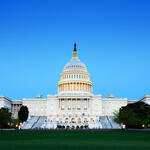- Date: 09 February 2022
- Author: Michele Parmelee, Deloitte Global Deputy CEO and Chief People and Purpose Officer
Embedding climate consciousness into organizational culture can help attract and retain talent
The Netflix film “Don’t Look Up,” which many of us have streamed while isolated at home, satirizes society’s inability to take swift action even in the face of the most dire threats. A not-so-subtle metaphor for the climate crisis, the movie struck a chord among those who are apprehensive about our collective future, and rightly so. With extreme weather events becoming more frequent, it is time to take bold action while there’s still time to limit the damage.
For businesses, beyond the fact that prioritizing environmental sustainability is the right thing to do for the planet, there are also clear business benefits in doing so. For one, we know that companies’ climate strategies have become increasingly important to today’s workers. Businesses that evolve operations and embed environmental, social, and governance (ESG) consciousness into workplace culture will be a step ahead in the race for talent in a highly competitive marketplace.
Most CxOs understand this. The recently released Deloitte 2022 CxO Sustainability Report: The disconnect between ambition and impact, a survey of 2,000+ C-suite executives across 21 countries, found that business leaders agree environmental-sustainability efforts have a positive impact on employee morale and well-being (84%), as well as employee recruitment and retention (77%).
Yet, according to Deloitte Global’s 2021 Millennial and Generation Z Survey, their employees may not be impressed. While climate change and protecting the environment is a top issue of concern among Gen Zs and millennials, less than half of millennials and Gen Zs Deloitte surveyed think business is having a positive impact on society. And about 60% fear that business’ commitment to the environment will be less of a priority as leaders focus on pandemic-related challenges.
So, where’s the disconnect?
While companies are acting—66% of those surveyed in the CxO Sustainability Report say their companies are increasing the efficiency of energy use, for example—they are less likely to implement more difficult, “needle-moving” activities that embed climate standards into their business ethos, such as developing new climate-friendly products or requiring suppliers and business partners to meet specific sustainability criteria. These “needle-moving” actions—along with others identified by Deloitte’s research—are indicators of broader and deeper climate ambition. Broader because they go beyond the four walls of the organization and deeper because they ingrain sustainable practices into their operations.
What can organizations do to turn their ambition into action, and action into impact? How can they evolve their climate commitments in ways that improve recruitment and retention?
They can start by educating senior leaders and the board on how to assess the impact of a changing climate on the business, as well as the business’ impact on the climate. Only then can they earn the broad senior leader buy-in and influence that will prompt “needle-moving” actions and effect meaningful transformation.
Businesses can also empower employees to act as climate changemakers. By engaging and educating employees on climate change impacts—decisions about what they consume, use, and buy—companies can help their people make positive climate choices at home and at work, while amplifying these actions through their personal networks.
Thinus Keevé, Chief Sustainability, Property and Export Officer at Australian supermarket chain Coles shares how their employees have felt the positive effects of transparency and participation, saying,
“Our team members tell us how proud they are of our sustainability work. They love it, they see it in stores, and they know what we are doing and how we are contributing.”
Ultimately, leaders that build on credible climate commitments and integrate sustainability into every part of the business will earn the trust of their stakeholders.
We’re in a decisive decade to act against climate change, and bold actions resulting in measurable impact are needed to accelerate the pace of intervention—while there’s still time to limit the damage. Organizations willing to “look up” and face climate challenges head-on not only can help improve our world, but they’ll also have an advantage in the battle for talent.
_________________________________________________________________________________________________
This post does not necessarily represent the views of WWF.
- Date: 06 October 2021
The recent IPCC report on the physical science basis of climate change could not have been clearer about the need for immediate action to address the crisis. With this report, there has been a heavy focus on the necessity to mitigate the emissions the world pumps into the atmosphere. Equally important, and not to be overlooked, should be the point that the effects of climate change are only going to intensify, and we have to do more to limit the vulnerability of coastal communities to these threats, particularly for those already on the front lines of the crisis.
- Date: 28 April 2021
- Author: Punit Renjen, Deloitte Global CEO
Each year, Deloitte surveys the Millennial and the Gen Z cohorts asking them to share their top concerns about business and society. Prior to the pandemic, both groups ranked climate change and protecting the environment as issues that mattered the most to them. When we revisited the question in May 2020, in the midst of the pandemic, not much had changed. Even though healthcare and disease prevention edged slightly ahead among Millennials, climate change was still the top concern for Gen Z.
In a separate Deloitte survey, we asked 750 business executives in thirteen countries a similar question, and over 80% of them acknowledged that their organizations are concerned about climate change. However, 65% of them also acknowledged that their companies have had to cut back their environmental sustainability initiatives due to the pandemic.
Despite this, it is clear there is a determination to act. With nearly one in four businesses, according to our recent climate survey, experiencing the operational impacts of climate change and communities around the world already dealing with its harsh realities, the crisis is here now.
In the past year, we’ve seen how taking aggressive action against COVID-19 has inadvertently improved our environment. But as vaccines roll out, and people return to some form of pre-pandemic life, these environmental gains could dissipate fast. Scientists expect air pollution levels to rebound, and even surpass previous benchmarks, in the coming months.
We can’t afford to return to business as usual. We must reclaim the ground we’re losing, and push forward even further. Businesses can, and must, lead the way—in part because, by changing our behavior, we can have an immediate, significant and lasting impact.
For Deloitte, this means continuing to examine and retool every aspect of our operations to combat climate change and delivering our WorldClimate strategy to accelerate our efforts to achieve net-zero emissions by 2030. As part of our commitment, we have also created a global campaign, #iAct, to empower and inspire all Deloitte professionals to take climate action.
This month, in collaboration with World Wildlife Fund, we are engaging and educating our people on their own climate change impacts – decisions about what they consume, use, and buy. Our goal is to enable our 330,000 professionals to make positive climate choices at home and at work, and amplify these through their personal networks. Our actions include:
- Educating our people through a mandatory learning, climate impact quiz, awareness campaigns and social media engagement;
- Partnering with world-leading subject matter experts to ensure we are leveraging the latest science and insights;
- Enabling our people to make more sustainable choices, in turn, influencing those around them to amplify this impact.
Inspiring our people to become climate change agents is a powerful component of our WorldClimate strategy. This is further amplified through the work we do with clients and ecosystems to bring innovative climate solutions that will help us transition to a low carbon future.
I believe a future completely upended by climate change isn’t destined to become our reality. If we respond boldly and collectively to this moment, our future doesn’t have to be preordained. We owe that much to the future generations who are rightly worried about the planet they are inheriting.
- Date: 27 January 2021
- Author: Katherine Devine, Director of Business Case Development, WWF
The Possibility Is Closer than You Might Think
Many large companies have made environmental commitments to reduce embedded greenhouse gas emissions in the products they make or sell, yet are struggling to reach them. Scope 3 emissions pose a particular set of challenges—all the indirect emissions that occur both up and downstream in a company’s value chain, including from primary production, such as those emitted while producing milk on dairy farms. Within the food industry, supply chains are complex, with many ingredients going into diverse product portfolios. The dairy industry’s Net Zero Initiative¹ (NZI) has established the goal of reaching net zero GHG emissions by 2050 and has set a bold agenda to achieve this goal. Recent analysis conducted by The Markets Institute @ World Wildlife Fund—based on assumptions and data shared by stakeholders in the dairy industry—demonstrates that achieving net zero for large farms is possible with the right practices, incentives, and policies within five years. If businesses also step up to make investments and collaborate with dairy farmers in their supply chain, the potential to reach these goals can become even more tangible.
- Date: 16 December 2020
- Author: Sheila Bonini, Senior Vice President, Private Sector Engagement
As we marked the 5-year anniversary of the Paris Agreement this past weekend, I am filled with hope -- much needed in this particularly challenging year.
The past few weeks have been an inflection point -- considering the United States election of a new administration and the landmark rollout of the COVID-19 vaccine. As we look toward 2021, we now can envision exciting progress as we regain momentum on climate action in the U.S. President-elect Biden has long been a champion of addressing climate change and the loss of nature. We anticipate the United States will rejoin the Paris Agreement in 2021 -- a critical first step to restore the health of our planet and a collaborative relationship with our global allies.
Widespread support for the bold climate action we need has grown more energetic and powerful. Youth activism has elevated climate justice across the world. From the farmlands in Nigeria to major U.S. cities, youth are demanding climate change action. Through social media, these young activists are coordinating their voices and efforts, and increasing pressure on our leaders toward positive change in our world.
The youth are not alone. When the Trump Administration announced its intent to withdraw the United States from the Paris Agreement back in 2017, business, local and state government, academic and other leaders in the United States came together to say “We Are Still In.” Over the past four years, nearly 4,000 local leaders across all 50 states, representing over half of the U.S. population, nearly two-thirds of its economy and more than half of the country’s emissions, have come together behind this shared commitment to uphold the Paris Agreement and lead by example.
And this past December 10th, We Are Still In stepped up once again to recommit to bold climate action, with the message that U.S. businesses, communities and many more are ready for a national mobilization on climate and recovery (www.americaisallin.com).
Efforts like these to drive decarbonization through cross-sector collaboration now exist around the world. They have developed into a global network of national coalitions, the Alliances for Climate Action. They feature leaders, many from the corporate sector, setting a strong example, building support for climate action, and engaging on national policies to accelerate decarbonization.
Every day, more companies, large and small, are proudly announcing their voluntary commitment to climate action. Indeed, this is good news. But, inconsistent corporate claims about climate action and confusion around terms such as net zero and climate neutral only add to the noise -- and raise doubts among stakeholders as to the credibility of individual companies’ climate strategies. As such, even those with the best intentions face considerable hurdles when setting climate goals, crafting climate strategies and communicating them to the public.
Companies need to focus on actions that underpin a truly effective corporate strategy for mitigating the effects of climate change and protecting nature. WWF’s new report, Beyond Science-Based Targets: A Blueprint for Corporate Action on Climate and Nature, explains how this can be accomplished. It is a tool configured for companies to craft an action plan for maximizing their climate impact. It can be used both by companies looking to create their first comprehensive climate strategy and by those hoping to upgrade their strategies to stay atop the leaderboard.
The legacy of climate inaction at the U.S. federal level has left us with a huge challenge. While national governments have an essential role to play, we need every sector of society to step up and do more to reduce emissions. We also need collaborative action across sectors to call on national governments to set the ambition and supportive policies to where they need to be, aligned with science.
2021 is primed to be a momentous year for global climate action, one filled with opportunity to decouple our recovery from GHG emissions and build back better. But to seize the opportunity, we need strong leadership from the corporate sector. We’re counting on you. Together, and strategically, we can realize significant progress for our planet.
- Date: 28 October 2020
Thermal energy emissions from industrial production may be the largest remaining unaddressed climate challenge you never heard of. Well, that’s about to change. Industrial thermal energy generates 11% of U.S. greenhouse gas (GHG) emissions—more than the entire US agricultural sector. Globally, energy used for heating and cooling is 50% of final energy use and contributes 39% of greenhouse gas emissions from energy-related sources.
Not surprisingly, for many years decarbonizing industrial energy took a back seat to the big challenges of developing and deploying renewable electricity in the power sector, as well as electric vehicles and new mobility strategies in transportation. With economic tailwinds now driving rapid commercialization and deployment in these sectors, it’s time to turn our collective attention to renewable energy solutions for industrial production, including hydrogen, biogas, biomass, electrification, and solar thermal among others.
Building on WWF’s successful efforts to mobilize large corporate electricity buyers to use their collective demand to make it easy to buy renewable electricity, WWF, the Center for Climate and Energy Solutions (C2ES), and David Gardiner and Associates formed the Renewable Thermal Collaborative in 2017. The RTC is a unique buyer-led coalition of major commercial and industrial energy buyers and sellers dedicated to collective action to solve the thermal energy challenge. RTC gives large thermal energy buyers "power in numbers," where they can learn from each other and collaborate with everyone needed to identify and overcome the many technological, market, financial and policy challenges to renewable energy solutions.
In the past three years, RTC members and technology providers have uncovered barriers, identified promising opportunities and are creating collective strategies for tackling those barriers. Several leading RTC members have successfully invested in renewable thermal solutions with significant emissions and cost savings. The cost of many renewable and low carbon thermal technologies is dropping, though we have a long way to go before thermal solutions match our progress on renewable electricity. That’s why RTC is convening the first annual RTC Summit from November 9-10, 2020.
The Summit offers a unique opportunity to join this growing community where you can learn from industry leaders about current and emerging technologies, connect with corporate peers and experts about barriers and opportunities in the renewable thermal market, and understand the policy landscape and what still to be done.
Over the course of the Summit, RTC members and stakeholders from across the corporate, technology, finance, innovation, and policy sectors will explore how to overcome the barriers faced by renewable thermal solutions, how to drive implementation, and develop lasting networks that will put us on the path to reducing industrial sector thermal emissions by 30% by 2030 and full sector decarbonization by 2050.
Register now and join your peer companies in this growing corporate renewable thermal movement. Please reach out to Marty Spitzer to learn more about RTC and the Summit.
- Date: 11 June 2020
- Author: Elan Strait, Director, US Climate Campaigns
The United States has not had a consistent role or leadership voice when it comes to the global response to climate change - leading the negotiations on Kyoto, and then withdrawing; leading the negotiations on Paris, and then withdrawing. But beneath that instability lies a consistent and positive trend in the actions of everyday people and their communities, a strong and growing desire for America to rise to the climate challenge. Last week marked the third anniversary of President Trump's announcement of his intent to withdraw the US from Paris. The world looks remarkably different than it did then, and many of us are grappling anew with the pervasive and debilitating forces of racism and the rolling devastation of the coronavirus. Today, we want to celebrate positive trends in climate action, specific to the role of non-federal actors, that have continued unabated during that time and have the potential to scale.
- Date: 11 March 2020
- Author: Lisa Frank
At Lisa Frank Inc, nature is one of our greatest inspirations, which shouldn't come as a surprise to anyone. We produce art filled with adorable creatures and vivid colors to celebrate animals and wildlife. There's a special feeling of joy and awe that fills you up when you think of the majestic creatures that roam our planet. That feeling is what Lisa Frank always tries to capture with our designs.
For animal lovers, including so many of the Lisa Frank fans and followers, the past several months have been incredibly tough. The wildfires in Australia were so widespread and so devastating. The terrible toll these fires have taken on people, animals, and nature, is almost too much to bear. But even in the face of something so horrible, we can't give in to feelings of hopelessness. While most of us may not be firefighters or environmental scientists, every single one of us can do something to help.
In Lisa Frank's case, that means using the power of our designs and the reach of our business to raise funds for World Wildlife Fund to help with restoration and recovery efforts in Australia. We also want to give the Lisa Frank audience, especially our youngest fans, an easy way they can contribute and help make a difference.
To support this important cause, we issued a collection called, "I heart; Koalas." It's a design in classic Lisa Frank style, full of whimsy, color, and joy. While our motivations for starting this campaign are heartbreaking, we deliberately wanted to use an image that would give our fans that same warm, fuzzy Lisa Frank feeling. Our design reminds people why they care about wildlife, sparking them to contribute to the effort out of joy, love, and hope, not out of fear or sadness.
While the reality for wildlife on our planet isn't always sunshine and rainbows, it's so important that we continue to celebrate the love we have for nature, focusing on what we can save and restore, rather than what we've lost. This attitude is shared by World Wildlife Fund, which is why we're so excited to support them through this project. We want Lisa Frank's fans to know that there's a role for everyone to help, both with the recovery effort in Australia and with conservation around the world. Any individual -- and any business, including ours -- can do their part. And together by showing how much we care about wildlife, each of our efforts can add up to something incredible.
- Date: 13 February 2020
The United States must achieve net-zero greenhouse gas emissions by no later than 2050, if the world has any hope of limiting warming to 1.5 degrees - the level at which the world can likely avoid the most catastrophic impacts of climate change. WWF believes that national legislation setting a price on carbon, as well as a mandatory net-zero target for 2050 or earlier - with intermediate targets between now and then - is essential to charting a durable and ambitious pathway for the whole country. Such an approach would require the federal government to use every tool at its disposal - existing authorities under the Clean Air Act and Clean Water Act, budgetary authority with respect to transportation and other sources, research and development capacity, and many more - to transform the energy economy in the United States. The roadmap released today by the Climate Leadership Council (CLC), of which WWF-US is a member, is a good step in the direction of achieving this vision. It advances a clear framework that can help set the stage for bipartisan climate negotiations - but more work remains.
As WWF continues to engage with the CLC and others in Congress, the private sector, and civil society who are working to craft a lasting national climate policy, we will be guided by the following criteria:
America’s national climate policy should:
- Reduce emissions by 50% below 2005 levels by 2030, and
- Achieve greater than net-zero emission levels by 2050 at the latest.
WWF supports a policy approach that:
- Creates a legally mandatory pathway to our emissions goals,
- Provides for a just transition for all Americans, and
- Respects the rights of indigenous people and frontline communities in the United States.
The right policy approach will combine the following mechanisms:
- A price on carbon and other greenhouse gas emissions,
- Complementary regulation, particularly of air pollution from mobile sources,
- State programs that provide locally appropriate approaches to reducing emissions, and
- Support for voluntary initiatives, such as those taken by the private sector to set and achieve science-based emissions targets.
The CLC roadmap aligns with some of these criteria but not all. Specifically, WWF has concerns about preempting, suspending, or repealing EPA’s authority to regulate stationary sources of greenhouse gas emissions. In fact, under a national climate policy, the EPA would need to be strengthened and fully funded, using every authority available to reduce greenhouse gas emissions. In our ideal policy design EPA would:
- Have the authority to regulate sources of emissions from stationary sources on both climate and environmental justice criteria;
- Continue to set and enforce regulations for mobile sources, and efficiency programs for appliances, lighting, and buildings;
- Measure and evaluate the emissions that inform a carbon price;
- Cooperate with states and local governments on setting climate plans; and
- Enforce binding targets for emissions reductions.
The need for an ambitious and binding climate policy is urgent. The lack of a proper national response from the wealthiest nation on Earth to our greatest existential threat drains ambition from the global community at a moment when we need to move farther and faster than ever.
The CLC roadmap matters because it provides a forum for a range of voices from across sectors – including many that have traditionally been at odds with each other – to discuss a way forward on addressing the climate crisis. WWF thanks CLC for advancing this discussion and looks forward to being a constructive voice in the months ahead.
- Date: 09 January 2020
- Author: Jason Clay
The Markets Institute at WWF identifies global issues and emerging trends around the most pressing challenges of our time to help us all learn and shift faster. As always, we'll be tracking a wide variety of food and soft commodity issues, trends, and tools as we move into 2020, dubbed the super-year for the environment. We know we will see more political volatility and financial crises, and the impacts of climate change to not only be felt more deeply but also recognized for what they are—a ticking time bomb for the future so long as they are not addressed. Here are just a few of the other issues, trends and tools we will be tracking this year:








